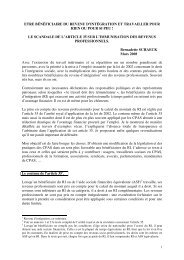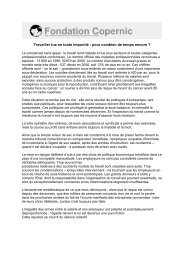Awra Amba RJ 300612 EN - Contacter un comité local d'Attac
Awra Amba RJ 300612 EN - Contacter un comité local d'Attac
Awra Amba RJ 300612 EN - Contacter un comité local d'Attac
Create successful ePaper yourself
Turn your PDF publications into a flip-book with our unique Google optimized e-Paper software.
39 / 85<br />
3. Values and principles<br />
each other, destroying their environment and therefore acting in f<strong>un</strong>damental contradiction with rules<br />
of their religion and of all religions. (Ya08/69).<br />
The <strong>Awra</strong> <strong>Amba</strong> members, from various religious backgro<strong>un</strong>ds, although the majority are of Muslim<br />
origin, believe only in one creator of all things, like Muslims and Christians. If human beings believe<br />
in the existence of one creator, they should call him only "creator" (Yi07/56). Humankind has been<br />
therefore created from an initial couple (Yi07/50): so, the evolution of species is not recognized.<br />
Therefore, the <strong>Awra</strong> <strong>Amba</strong> comm<strong>un</strong>ity does not follow any religion, and they believe in honesty and<br />
love for all human beings. Zumra says: "God is everywhere aro<strong>un</strong>d us and in us. There is no need to<br />
shut him in a church or in a mosque. We don't give him a name, because that is the way to divide<br />
humans. We don't believe in life after death, as we have no proof of that. We build our paradise in<br />
this life, by working and showing solidarity to others." Timbwalel, the comm<strong>un</strong>ity guide, says: "we<br />
have no Bible, but we put into practice the main principles we fo<strong>un</strong>d in the holy books: no theory,<br />
but practice" (Jo10b/5), expressed also by Zumra (Crespo, 2011): "we are practical, we need peace,<br />
we build it. We need to help each other, we do."<br />
Therefore, there is no religious rite, and practically no religious belief except the existence of one<br />
creator. The f<strong>un</strong>damental values of all religions are nevertheless especially present and above all<br />
implemented (Jo10b/5).<br />
Moreover, <strong>Awra</strong> <strong>Amba</strong> is in favour of freedom of behaviour and thought for everyone, while in the<br />
surro<strong>un</strong>ding comm<strong>un</strong>ities, each one has a rigid role defined by his comm<strong>un</strong>ity (Ya08/70). The<br />
comm<strong>un</strong>ity members express their willingness to live with followers of other religions as long as<br />
they accept behaviours other than their own (Yi07/57): it is very close to secularism. However, there<br />
are no such followers in <strong>Awra</strong> <strong>Amba</strong>, because of their potential isolation according to Yi07/57.<br />
As <strong>Awra</strong> <strong>Amba</strong> inhabitants perceive their culture as a religion, and for facilitating comparison with<br />
surro<strong>un</strong>ding comm<strong>un</strong>ities, Yirga (2007/58) calls religion their culture. In our opinion, it is a<br />
f<strong>un</strong>damental mistake (recognized anyway later by Yirga), because the <strong>Awra</strong> <strong>Amba</strong> culture does not<br />
refer to supernatural forces, they try to influence by rites or behaviours. If they refer to a god creator,<br />
it has no part in the welfare of present or future generations, of which they are alone responsible: the<br />
future of humankind belongs only to men and women; therefore to recognize an original creator is<br />
entirely of secondary importance.<br />
Therefore, in our opinion, The <strong>Awra</strong> <strong>Amba</strong> comm<strong>un</strong>ity has a very rational behaviour, which makes<br />
rationalism another main value of the comm<strong>un</strong>ity, although on the face of it they don't know the<br />
word.<br />
3.4.2. Work<br />
According to a socioeconomic survey conducted in 2003 in the Amhara region, more than half of the<br />
insufficient rainfall areas have at least 156 holidays and then non work days a year, i.e. 43 % non<br />
work days (Ya08/73).<br />
At the same time, we have seen some trades are ostracized; but more globally, craftsmen have<br />
traditionally a lower status and are sometimes considered as sub-human. They are not slaves, but<br />
they have fewer rights, intercourse with them is limited, they cannot enter houses except on special<br />
occasion, food is served to them from leaves or broken vessels, even meeting commoners on the<br />
roads they had to kneel and look the other way, etc. (Haberland, 1978/131). The Amhara society<br />
depreciates therefore craftsmen and manual occupations, which is not in favour of diversification of<br />
peasants towards craft activities (At05/49; Ya08/28). For instance, craftsmen producing cotton<br />
clothes are despised (At05/73).<br />
On the contrary, <strong>Awra</strong> <strong>Amba</strong> considers work as a moral value, even the most important one, "the<br />
essence of life" as said by a comm<strong>un</strong>ity member (At05/48; Ya08/73). Work is an answer to poverty,<br />
but it is first of all a means of accomplishment and to be involved in the comm<strong>un</strong>ity welfare, a

















